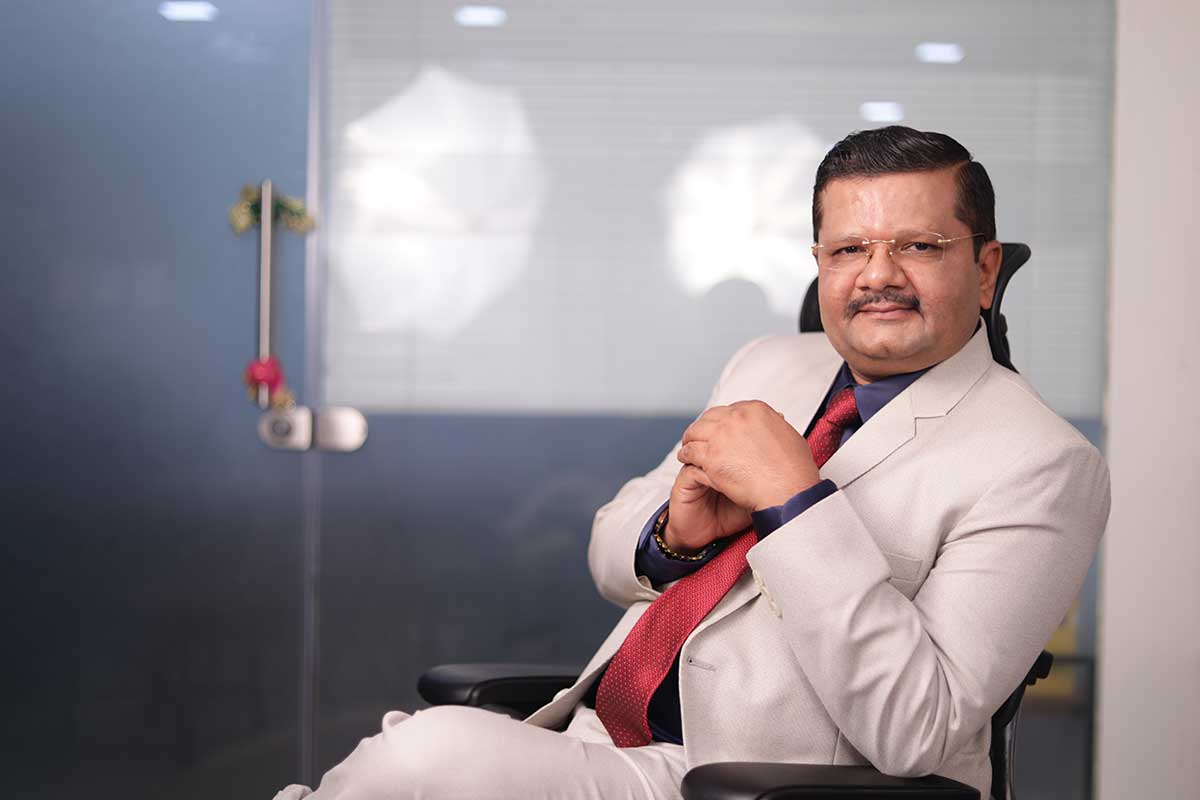Featured
Maheshkumar Jogani, CMD Jogani Reinforcement Explains Why Innovation Is the most Effective Tool For Asset Creation
Innovations are happening everywhere and at an unprecedented speed. Strategic management, innovative creation, and tactical thinking are essential links to build a successful commercial venture. How these concepts fuel enterprise is something entrepreneur’s never stopped exploring.

Innovations are happening everywhere and at an unprecedented speed. Strategic management, innovative creation, and tactical thinking are essential links to build a successful commercial venture. How these concepts to fuel enterprise is something entrepreneur’s never stopped exploring.
There is no doubt that the pulse of corporate evolution lies in innovation. Today, people progressively realize that innovations are even more serious than in the past. Thus, business companies invest in knowledge-based capital as an intangible asset such as innovation to survive and climb in the global market. To survive, rather than the productivity of the manual labour, companies need creative and knowledgeable workers whose novel ideas are, to a certain extent, a necessity for the companies’ continued existence and future success.
Contemporary society is highly reliant on innovations. A learned businessman like Mr. Maheshkumar Jogani, CMD of Jogani Reinforcement, stresses that Executing an idea that addresses a specific challenge and achieves value for both the self and society. What is important to understand is that the innovation need not be grandiose. Instead, it must be simple and focused on addressing a specific issue or need to be effective. It is always better to start small, requiring limited resources, few people, and only a small market. Otherwise, it will be too late to make the required changes and adjustments that are consistently required in the early stage. Innovations should be taken as a never-ending process, but at the same time, they should not be too complex to be handled by an ordinary human.
A great example can easily make one understand the above logic. Karsanbhai Patel, the billionaire industrialist and founder of Nirma Group, did not invent detergent but what he worked on was an innovation. Instead, his innovation in making limited and low-cost products, its distribution, money-back guarantee, housewife-friendly advertisement, and appealing price point, translated into Nirma story where an Indian entrepreneur took over the dominant MNCs and revolutionized the rules of the detergent market.
According to Mr. Maheshkumar Jogani, a prominent figure in reinforcement technologies, “Innovation is easy, effective and economical tool for asset creation.” The scholarly and successful entrepreneur leads the concrete fiber manufacturing company Jogani Reinforcement dealing in next generation Polypropylene, Polyfiber 3S, Synthetic Monofilament Fiber, Concrete Fiber and Construction Fibre which are proven solutions for Crack Reduction in all type of Constructions and Infrastructures. Mr. Jogani is a new-age entrepreneur who believes that a business‘s core strategy should be focused on quality research and development. The reason why he created innovative methods and patented the same. His work is widely acknowledged by Indian and International Construction Companies.
India has already registered itself as the world’s foremost outsourcing terminus for globally, predominantly in the knowhow sector – but the time is ripe for the world’s most populous country to reinvent itself as far as the Fourth Industrial Revolution logic goes on. We have realized the importance of innovation, often termed “knowledge-creation,” in our country’s economic growth. Investing in such intangible assets is to be considered strategic investments in the long-term growth of businesses.
There is a burgeoning start-up and innovation culture, as shown by the Global Innovation Index, where India has improved in creating a new tech-enabled ecosystem, thereby amending its ranking from 81 to 52 between 2015 and 2019. As an artificial intelligence innovation hub, India ranked eighth in the top ten countries By AI patent families, reveals a study. 21st-century pioneer companies are already using AI to innovate and grow fast.
The bottom line- Businesses that understand how to harness AI can surge ahead. Those that neglect it will fall behind. www.joganireinforcement.com
Featured
Nima Sulaiman joins HiLITE Group Board, her father gifts her a Porsche
Nima expressed her gratitude for the opportunity and her eagerness to contribute to the group’s success.

In a move signalling a generational shift in leadership and a commitment to empowering women in the business world, Nima Sulaiman, the daughter of HiLITE Group Chairman P. Sulaiman, has been welcomed onto the board of directors with a stunning gesture—a Porsche worth Rs 3 crore.
At just 18, Nima began her journey with HiLITE Group as a customer service trainee at Hug a Mug Cafe. From there, she transitioned to management roles, showcasing her talent and dedication. With a B.Sc in Economics from the University of London in Singapore, Nima brings a unique blend of academic prowess and practical experience to her new position.
As the Director of HiLITE Urban, a subsidiary of HiLITE Group, Nima is poised to continue the company’s legacy of excellence in construction and development. With a focus on providing quality living spaces and international standards in India, HiLITE Group has been instrumental in transforming Kozhikode city with its innovative projects that include premium residential buildings, ultra modern business parks, state-of-the-art malls and world-class entertainment theaters.
Group Chairman P. Sulaiman expressed his sentiments regarding his daughter’s recent appointment within the Group. He said, “I am immensely proud of Nima’s accomplishments and firmly believe that she is capable to take on greater responsiblities. HiLITE Group has always shed light on the significance of acknowledging and empowering women in leadership positions.” He further emphasised, “The emotional intelligence that women bring to the table is pivotal for fostering effective leadership and establishing trust.”
Nima, in turn, expressed her gratitude for the opportunity and her eagerness to contribute to the group’s success. “Inspired by my experiences visiting renowned malls worldwide, I strive to enrich the atmosphere of HiLITE malls and other projects, infusing them with vibrancy and youthfulness,” she said.
The appointment of Nima Sulaiman to the board of directors represents a significant milestone for HiLITE Group and a testament to the company’s commitment to innovation and inclusivity in the business world. As Nima takes on her new role, she stands as a beacon of inspiration for young women entrepreneurs in South India and beyond.
Featured
Steps to effective retirement planning
The importance of retirement planning depends on ensuring you have adequate funds to live comfortably after you stop earning a stable income.

Retirement planning is a critical aspect of financial stability that often goes overlooked until it’s too late. In India, where the culture of savings is ingrained yet formal retirement planning is still evolving, understanding, and initiating a retirement plan is more crucial than ever.
The importance of retirement planning depends on ensuring you have adequate funds to live comfortably after you stop earning a stable income. It is not only about saving a part of your earnings but also about investing in yourself. Here are some crucial reasons to begin retirement planning – combating inflation, securing financial freedom, managing medical expenditures, maintaining your living standard, supporting family requirements, meeting post-retirement goals, preparing for unanticipated circumstances, and leaving a legacy for dependents.
Here are ways to effectively plan your retirement –
Ø Utilise an online retirement calculator
An important instrument for planning, an online retirement calculator can assist you estimate how much you require to save to live a post-retirement life. It factors in your existing age, savings, retirement age, investments, and anticipated inflation rates.
Anjali is looking to retire at the age of 60 with a lifestyle that needs Rs 50,000 per month. Utilising an online retirement calculator, she considers her existing age of 30, anticipated inflation of 6 per cent and prevailing savings. The calculator estimates she needs a corpus of approximately Rs 2.5 crores to sustain her retirement life, helping her strategise her savings and investments accordingly.
Ø Start early
The sooner you start, the more you benefit from compound interest. Even starting small can lead to substantial growth over decades.
Imagine Rohit, who starts saving Rs 5,000 a month at age 25 in a mutual fund that averages an 8% annual return. By the time he turns 60, his investment would have grown to over Rs 1.50 crore, thanks to compound interest. In contrast, if Priya starts saving the same amount at 35 under the same conditions, she would accumulate about Rs 67 lakhs by age 60. The decade-long head start allows Rohit’s investments more time to compound, significantly impacting his retirement corpus.
Ø Create a retirement budget
Estimate your post-retirement expenses, considering inflation and changing lifestyle needs. Including fixed expenses, healthcare, leisure, and unexpected costs.
Vijay, nearing retirement, lists down his monthly expenses including groceries, utilities, healthcare, and leisure activities like travel and hobbies. Considering inflation, he predicts his current monthly expense of Rs 30,000 will rise to Rs 80,000 by the time he retires. This projection helps him understand how much he needs to save to maintain his lifestyle post-retirement.
Ø Opt for a pension plan
Investing in pension plans offered by insurance companies can guarantee a steady income post-retirement. They also provide tax benefits under Section 80C.
Raj invests in a pension plan that promises a monthly income of Rs 20,000 after retirement. This plan not only secures his future financially but also offers tax benefits today, making it a win-win investment for his retirement years.
Ø Diversify your investment portfolio
Do not put all your eggs in one basket. Invest in a mix of asset classes including equity, debt, mutual funds, and real estate. Consider your risk appetite and investment horizon.
Meena, an investor, allocates her savings across different asset classes—40 per cent in equity for growth, 30 per cent in bonds for stability, 20 per cent in mutual funds for diversified exposure, and 10 per cent in real estate for passive income. This diversification helps balance her risk and provides multiple growth avenues, ensuring her portfolio is well-equipped to handle market volatility.
Ø Maximise your EPF and PPF contributions
The EPF or employee provident fund and PPF or public provident fund are excellent tax-saving instruments that offer secure, high-interest earnings for retirement.
Sunita contributes the maximum allowable limit to her EPF and PPF accounts every year. These contributions not only reduce her taxable income but also accumulate tax-free earnings, creating a significant retirement fund that’s secure and government-backed.
Ø Maintain an emergency fund
Ensure you have an emergency fund worth at least 6-12 months of living expenses. This fund should be easily accessible and kept separate from your retirement savings.
Deepika saves six months’ worth of expenses in a liquid fund, separate from her investments and retirement savings. This fund acts as a financial cushion during unexpected events, such as medical emergencies or sudden unemployment, ensuring her long-term plans remain undisturbed.
Ø Invest in NPS or national pension scheme
The NPS is a government-backed retirement planning instrument that is market-linked and offers various fund options based on your risk tolerance.
Karan opts for the NPS, choosing a mix of equity, corporate bonds, and government securities, aligning with his moderate risk appetite. This allows his retirement savings to grow with the market while offering the flexibility to adjust the asset allocation as he gets closer to retirement.
Ø Educate yourself financially
Stay informed about financial planning, investment options, tax laws, and market trends. Knowledge is power, especially when it comes to managing your money.
Neha spends her time reading blogs linked with finance, attending workshops, and consulting with financial professionals. This constant learning equips her with considerable knowledge to make better decisions about her tax planning, investments, and retirement plan, ensuring she enhances her financial potential.
Ø Assess as well as adjust your plan periodically
Your retirement plan should adapt to your changing life circumstances. Annually, review your assets, savings, and goals and make any necessary modifications.
Every year, Amit updates his retirement plan to reflect changes in his income, spending, and life goals. This regular review keeps him on pace with his retirement objectives, allowing him to make necessary modifications to his savings rate and investment selections.
Final thoughts
Retirement planning is more than a financial responsibility; it is a commitment to your future self. Beginning today not just secures your financial future, but even endows you with mental peace and the opportunity to spend your retirement years as you see fit. Attaining a comfortable retirement involves vision, a proactive attitude, and discipline. Note that it is never too early or very late, to begin with retirement planning. The steps you take now can result in a better and more secure tomorrow.
Featured
Supreme Court AOR firm Vedic Legal settles the debate: Can ancestral property be sold without the consent of successors?

New Delhi (India), June 24: Ancestral property is a valuable asset that is passed
down from one generation to another. It is a symbol of family heritage and pride
that holds significant sentimental value for many families. However, the question
that has been long debated is whether ancestral property can be sold without the
consent of all successors.
According to Indian law, ancestral property is considered to be the collective
property of all successors of the original owner. As a result, the sale of ancestral
property without the consent of all successors is generally not allowed. The
reasoning behind this is that ancestral property is seen as a collective asset, and
all successors have an equal right to it.
However, in certain cases, the sale of ancestral property without the consent of all
successors may be allowed by law. For instance, in cases where the owner of the
property has died intestate and there is no will or agreement in place, legal heirs
may be able to sell off the ancestral property without seeking consent from all
other successors.
It is important to note that the rules regarding the sale of ancestral property
without consent may vary from state to state. Therefore, it is essential to consult a
lawyer before making any decision regarding the sale of ancestral property.
Supreme Court Advocate on record firm with Vedic Legal, a renowned law firm
specializing in property and succession law, recently settled a landmark case in
the Supreme Court. The case involved the sale of ancestral property without the
consent of all successors, and Supreme Court AOR firm Vedic Legal argued that
such a sale was not permissible under Indian law.
The verdict of the Supreme Court, based on Supreme Court AOR firm Vedic Legal
arguments, confirmed that ancestral property could not be sold without the
consent of all successors. This ruling has set a precedent for future cases and has
provided clarity on a contentious issue that has long been debated.
The complexity of the issue of selling ancestral property without the consent of
successors is not lost on legal experts. It is crucial to consider the legal and
ethical implications of such a sale, as it can have significant consequences for all
parties involved.
In some cases, however, selling the ancestral property without the consent of all
successors may be the best option. For example, in cases where there are
disputes between heirs or when some heirs are not reachable, selling ancestral
property without the consent of all successors may be allowed by law.
Additionally, in certain circumstances, selling the ancestral property without
consent may be the only way to resolve financial difficulties faced by the owners of
the property. This may include situations where the owners require funds for
medical treatment or other urgent needs.
However, any decision to sell the ancestral property without the consent of all
successors should be made after careful consideration and consultation with legal
experts. It is essential to ensure that all legal requirements are met and that the
rights of all parties involved are protected.
The sale of ancestral property without consent is a complex issue that requires
careful consideration and legal guidance. While it may be possible in some cases,
it is generally accepted that ancestral property is a collective asset that cannot be
sold without the consent of all successors.
The recent landmark case settled by Supreme Court AOR firm Vedic Legal in the
Supreme Court has provided clarity on the legal aspect of selling ancestral
property without the consent of successors. It has set a precedent for future cases
and has highlighted the importance of seeking legal guidance before making any
decision regarding the sale of ancestral property.
-

 Entertainment7 hours ago
Entertainment7 hours agoHappy Birthday Samantha Ruth Prabhu: Social media wishes Queen of South Indian Cinema on her 37th birthday
-

 India News9 hours ago
India News9 hours agoDelhi Congress President Arvinder Singh Lovely resigns, says he feels handicapped under Deepak Babaria’s leadership
-

 Cricket news10 hours ago
Cricket news10 hours agoIPL 2024: Rajasthan Royals beat Lucknow Super Giants by 7 wickets and 6 balls to spare
-

 2024 Lok Sabha Elections8 hours ago
2024 Lok Sabha Elections8 hours agoPM Modi criticises Rahul Gandhi for allegedly insulting Hindu kings, accuses Congress of not addressing atrocities by Muslim rulers
-

 2024 Lok Sabha Elections5 hours ago
2024 Lok Sabha Elections5 hours agoElection Commission orders AAP to modify Lok Sabha campaign song
-

 India News4 hours ago
India News4 hours agoSecurity forces arrest 14 Pakistani nationals with around 86 kg of drugs, worth Rs 600 crore near Gujarat Coast
-

 Entertainment3 hours ago
Entertainment3 hours agoDIL-LUMINATI TOUR: Diljit Dosanjh creates history by performing for 54000 fans in Canada, post goes viral


